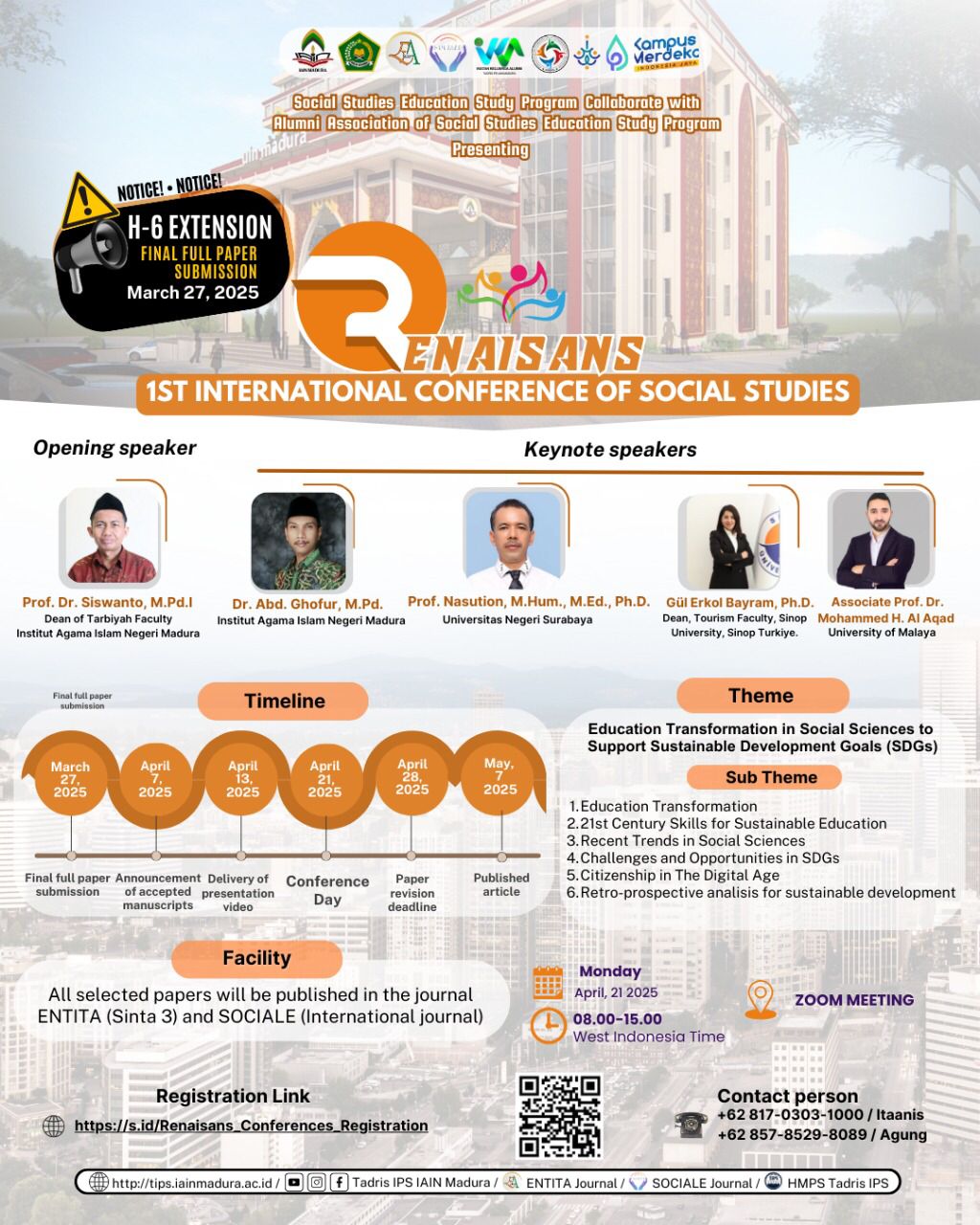Development of Wordwall Educational Game-Based Learning Media for Social Studies Learning Materials
 Abstract views: 249
,
Abstract views: 249
,
 PDF downloads: 177
PDF downloads: 177
Abstract
Learning media plays a crucial role in enhancing student interest, understanding, and engagement in the learning process. At SMP Negeri 1 Pamekasan, social studies learning is still dominated by conventional media, leading to student boredom, particularly among Generation Z and Alpha, who are more accustomed to technology. This study aims to develop and evaluate the validity of Wordwall educational games in social studies learning at SMP Negeri 1 Pamekasan. The research employs the Research and Development (R&D) method with the 4D development model by Thiagarajan, consisting of four stages: Define, Design, Develop, and Disseminate. Data collection was conducted using observation, interviews, questionnaires, and research instruments. Qualitative data analysis follows the Miles and Huberman framework, while quantitative data were processed to determine product feasibility using Eko Putro Widoyo's theory. The results indicate that the development of Wordwall-based educational game media for social studies subjects at SMP Negeri 1 Pamekasan, following the 4D model, is feasible, with a media feasibility score of 4.4 and a material feasibility score of 4.81, both categorized as "very good."
Downloads
References
Arimbawa, I. G. P. A. (2021). Penerapan Wordwall Game Quis berpadukan Classroom untuk Meningkatkan Motivasi dan Prestasi Belajar Biologi. Indonesian Journal of Educational Development, 2(2), 324–332. https://doi.org/10.5281/zenodo.5244716
Azizah, N. I. (2023). Pengembangan Media Pembelajaran Berbasis Wordwall Untuk Meningkatkan Prestasi Belajar Siswa Pada Materi Bangun Ruang Kelas V MI Raden Fatah Malang. Universitas Islam Negeri Maulana Malik Ibrahim Malang.
Fauziyah, Z. Z. (2017). Pengembangan Media Pembelajaran Berbasis Booklet pada Mata Pelajaran Bilogi untuk Siswa Kelas XI MIA 1 Madrah Aliyah Alauddin Pao Pao dan MAN 1 Makassar. In UIN Alauddin Makassar. UIN Alauddin Makassar Oleh:
Firmadani, F. (2020). Media Pembelajaran Berbasis Teknologi Sebagai Inovasi Pembelajaran Era Revolusi Industri 4.0. Prosiding Konferensi Pendidikan Nasional, 2(1), 93–97. http://ejurnal.mercubuana-yogya.ac.id/index.php/Prosiding_KoPeN/article/view/1084/660
Ismail, J. R. (2022). Pengembangan Lembar Kerja Berbasis Aplikasi WEB Google My Maps untuk Mencapai Kompetensi Dasar dalam Pembelajaran Geografi. Universitas Pendidikan Indonesia.
Julizawati, L. (2023). Pengembangan Media Komik Digital Untuk Meningkatkan Keterampilan Membaca Siswa Smpn 40 Pekanbaru. In Skripsi Thesis, UIN Suka Riau (Vol. 1, Issue 1). Universitas Islam Negeri Sultan Syarif Kasim Riau.
Kurniawan, G. F. (2022). Hakikat Ilmu Pengetahuan Sosial: Strategi Memahami dan Perbaikan Kesalahan Konsep. Jipsindo, 9(1), 64–78. https://doi.org/10.21831/jipsindo.v9i1.130617
McCrindle, M. (2021). Generation Alpha. Hachette UK.
Mulyadi, Syahrul, R., Atmazaki, & Agustina. (2020). The Development of E-Modules Based on Adobe Flash for Indonesian Subjects at IAIN Bukittinggi. Journal of Physics: Conference Series, 1471(1). https://doi.org/10.1088/1742-6596/1471/1/012002
Pradani, T. G. (2022). Penggunaan media pembelajaran wordwall untuk meningkatkan minat dan motivasi belajar siswa pada pembelajaran IPA di Sekolah Dasar. Educenter : Jurnal Ilmiah Pendidikan, 1(5), 452–457. https://doi.org/10.55904/educenter.v1i5.162
Prismanata, Y., & Sari, D. T. (2022). Formulasi Media Pembelajaran untuk Peserta Didik Generasi Z dan Generasi Alfapada Era Society 5.0. Proceeding of Integrative Science Education Seminar, 2(April 2011), 44–58. https://prosiding.iainponorogo.ac.id/index.php/pisces/article/view/697/427
Pujiono, A. (2021). Media Sosial Sebagai Media Pembelajaran Bagi Generasi Z. Didache: Journal of Christian Education, 2(1), 1. https://doi.org/10.46445/djce.v2i1.396
Rabi’ah. (2023). Pengembangan Media Pembelajaran Interaktif Berbasis Augmented Reality ( Ar ) Menggunakan Assembler Edu. Universitas Islam Negeri Ar-Raniry.
Rahma, & Nurhayati. (2021). Pengembangan Media Interaktif Berbasis Game Edukasi pada Pembelajaran Matematika. Jurnal Edukasi Matematika Dan Sains, 8(1), 38–41. https://doi.org/10.24815/jpsi.v8i1.16062
Siti Anisah, A., & Maratusholihah, M. (2023). Meningkatkan Pemahaman Konsep IPS Melalui Penerapan Model CORE (Connecting, Organizing, Reflecting, and Extending). Jurnal Pendidikan UNIGA, 17(1), 761. https://doi.org/10.52434/jpu.v17i1.2675
Sofia, N., Ritonga, M., Arita, S., Syahrul, S., Shalihah, M. A., Dewi, I. P., & Sofya, R. (2023). Peningkatan Keterampilan Berpikir Kritis Melalui Pengembangan E-Modul Perpajakan Berbasis Case Method. Jurnal Ecogen, 6(1), 54. https://doi.org/10.24036/jmpe.v6i1.14185
Utami, R. P. (2017). Pentingnya Pengembangan Media Pembelajaran Dalam Kegiatan Proses Belajar Mengajar. Jurnal Dharma Pendidikan, 12(2), 62–81.
Vitianingsih, A. V. (2017). Game Edukasi Sebagai Media Pembelajaran Pendidikan Anak Usia Dini. Inform : Jurnal Ilmiah Bidang Teknologi Informasi Dan Komunikasi, 1(1). https://doi.org/10.25139/inform.v1i1.220
Widyastuti, R., & Puspita, L. S. (2020). Pengembangan Media Pembelajaran Berbasis Game Edukasi Pada MatPel IPA Tematik Kebersihan Lingkungan. Paradigma - Jurnal Komputer Dan Informatika, 22(1), 95–100. https://doi.org/10.31294/p.v22i1.7084
Wuryan Andayani, et al. (2024). Studi Literatur Aspek Ekonomi, Sosial dan Lingkungan Tanggung Jawab Sosial Perusahaan PT Bukit Asam TBK. 175–192.
Yulistiorini, C. E., Wardani, S. Y., & Kadafi, A. (2022). Identifikasi Faktor Penyebab Burnout Belajar Pada. Prosiding Seminar Nasional Bimbingan Dan Konseling, 6(1), 10–15.
Copyright (c) 2025 Entita: Jurnal Pendidikan Ilmu Pengetahuan Sosial dan Ilmu-Ilmu Sosial

This work is licensed under a Creative Commons Attribution-NonCommercial 4.0 International License.
ENTITA: Jurnal Pendidikan Ilmu Pengetahuan Sosial dan Ilmu-Ilmu Sosial operates an Open Access policy under a Creative Commons Non-Commercial 4.0 International license. Authors who publish with this journal agree to the following terms:
- The copyright of the received article once accepted for publication shall be assigned to the journal as the publisher with licensed under a

- Journal is able to enter into separate, additional contractual arrangements for the non-exclusive distribution of the journal's published version of the work (e.g., post it to an institutional repository or publish it in a book), with an acknowledgement of its initial publication in this journal.
- Journal is permitted and encouraged to post their work online (e.g., in institutional repositories or on their website) prior to and during the submission process, as it can lead to productive exchanges, as well as earlier and greater citation of published work (see The Effect of Open Access).
- Here is Copyright Transfer Form that author can download and send to OJS during submission.

















